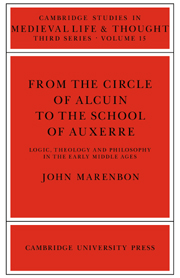 From the Circle of Alcuin to the School of Auxerre
From the Circle of Alcuin to the School of Auxerre Book contents
- Frontmatter
- Contents
- Acknowledgements
- Introduction
- 1 Aristotle's Categories and the problems of essence and the Universals: sources for early medieval philosophy
- 2 Logic and theology at the court of Charlemagne
- 3 Problems of the Categories, essence and the Universals in the work of John Scottus and Ratramnus of Corbie
- 4 The circle of John Scottus Eriugena
- 5 Early medieval glosses on the problems of the Categories
- Conclusion
- APPENDIX 1 Texts from the circle of Alcuin
- APPENDIX 2 A Periphyseon florilegium
- APPENDIX 3 Glosses to the Categoriae Decem
- Bibliography (including index of manuscripts and list of abbreviations)
- Index
3 - Problems of the Categories, essence and the Universals in the work of John Scottus and Ratramnus of Corbie
Published online by Cambridge University Press: 24 October 2009
- Frontmatter
- Contents
- Acknowledgements
- Introduction
- 1 Aristotle's Categories and the problems of essence and the Universals: sources for early medieval philosophy
- 2 Logic and theology at the court of Charlemagne
- 3 Problems of the Categories, essence and the Universals in the work of John Scottus and Ratramnus of Corbie
- 4 The circle of John Scottus Eriugena
- 5 Early medieval glosses on the problems of the Categories
- Conclusion
- APPENDIX 1 Texts from the circle of Alcuin
- APPENDIX 2 A Periphyseon florilegium
- APPENDIX 3 Glosses to the Categoriae Decem
- Bibliography (including index of manuscripts and list of abbreviations)
- Index
Summary
No early medieval treatment of the Categories and the problems connected with them is as wide-ranging or as original as that which John Scottus provided in his masterpiece, the Periphyseon. No other treatment had so much influence on the scholars of the late ninth and tenth centuries who tackled these problems. A study of the doctrine of the Categories as it appears in the Periphyseon will therefore provide a centrepiece to my whole survey. First, however, I will look at a piece of material which perhaps gives some clues to the direct antecedents to John's theory of Universals.
The only record which survives of a controversy on the World Soul between Ratramnus of Corbie and an unnamed monk of Saint-Germer de Fly is Ratramnus's Liber de anima ad Odonem Bellovacensem. This book, written in the early 860s, is a reply to the answer which the monk of Saint-Germer had written to Ratramnus's original objections to his ideas. However, the monk of Saint-Germer professed to be expounding, not his own views, but those of his master, a certain Macarius, who, despite several attempts, cannot convincingly be identified with any figure from other sources. This chronology would suggest that Macarius began to expound his views to his pupils some time in the 850s, if not before. Moreover, Macarius is described as ‘Scottus’, an Irishman, and this makes some connection, or common background, with John Scottus particularly probable, since the links between the various Irishmen on the Continent were strong.
- Type
- Chapter
- Information
- From the Circle of Alcuin to the School of AuxerreLogic, Theology and Philosophy in the Early Middle Ages, pp. 67 - 87Publisher: Cambridge University PressPrint publication year: 1981
- 1
- Cited by
